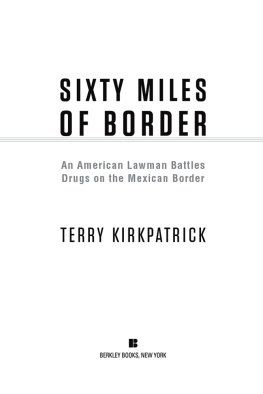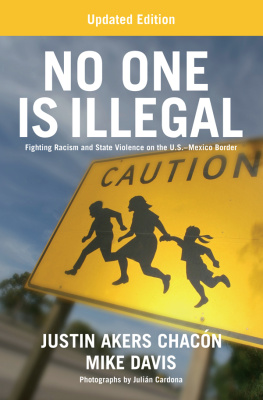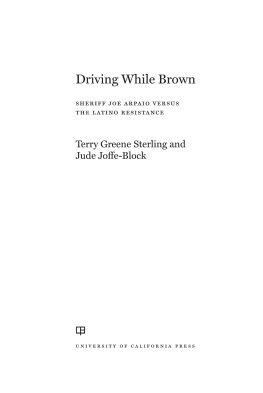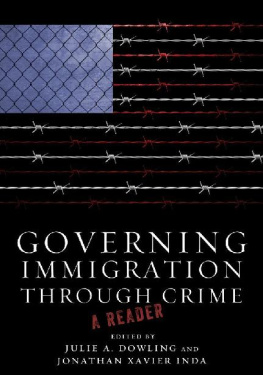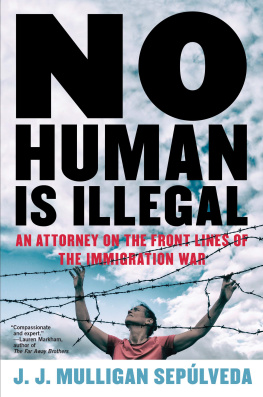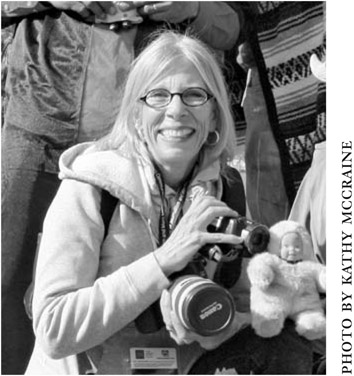ABOUT THE AUTHOR
Terry Greene Sterling grew up on a northern Arizona cattle ranch and has lived in Phoenix most of her life. For over twenty-five years she has reported from Arizona for a variety of publications. She was a staff writer for Phoenix New Times for fourteen years and then set out on her own. Her work has appeared in the Daily Beast , the Washington Post, Newsweek, Newsweek.com, salon.com , the Nieman Narrative Digest, Preservation Magazine, Arizona Highways, PHOENIX Magazine , the Arizona Republic , and High Country News , among other publications.
Sterling is a three-time winner of Arizonas highest journalism honor, the Virg Hill Journalist of the Year Award, and has received forty-six additional national and regional journalism awards. She is Writer-in-Residence at the Walter Cronkite School of Journalism and Mass Communication at Arizona State University, where she teaches magazine writing. This is her first book. She tweets @tgsterling and blogs at www.terrygreenesterling.com.
ADVANCE PRAISE FOR ILLEGAL
What a vivid portrayal of the Arizona immigrant underground. Illegal is not afraid to show the bad decisions immigrants make along with their resilience and strength of spirit. This is the total picture, a heartbreaking one in a state that has chosen to demonize its Mexican residents.
Tony Ortega, editor-in-chief,
Village Voice
No one brings you into the illegal immigration underground quite like Terry Greene Sterling. Her gritty descriptions of border crossers, transvestites, and child molesters will linger in your thoughts. Her achingly beautiful accounts of everyday people and tragic situations really stick with you. From Sheriff Joe Arpaios bravado to a locked-up moms longing for her child, the stories in Illegal are strikingly vivid, and the authors reporting flawless. No one should even attempt to speak on the matter of illegal immigration in Arizona without reading Illegal first.
Ashlea Deahl, editor ,
PHOENIX Magazine,
and blogger of girlinapartyhat.com
Arizona is ground zero in Americas immigration battles and Terry Greene Sterling writes about the struggles of the people involved with authority, passion, and compassion. Her insights and observations are detailed with nuance and substance that cant be acquired by dropping in when the story is hot. This book and her blog, White Woman in the Barrio, reflect her ongoing commitment to telling stories about the people in addition to the policies that are front and center in the immigration wars. If you want to understand what is going on in Arizona now, Illegal is the book to read.
Rick Rodriguez,
Carnegie and Southwest Borderlands Initiative professor,
Walter Cronkite School of Journalism, Arizona State University
With painstaking reporting, elegant writing, and a lifetime immersed in the culture, Terry Greene Sterling offers the most important lesson in the debate over illegal immigration: These are people were talking about, not statistics. Read this book and borders melt, as the author reminds us again and again that each immigrant has a story to tell. Greene Sterling is here to give voice. A powerful, necessary book, it should be required reading for all.
Amy Silverman, managing editor ,
Phoenix New Times
To buy books in quantity for corporate use or incentives, call (800) 962-0973 or e-mail premiums@GlobePequot.com .
Copyright 2010 by Terry Greene Sterling
ALL RIGHTS RESERVED. No part of this book may be reproduced or transmitted in any form by any means, electronic or mechanical, including photocopying and recording, or by any information storage and retrieval system, except as may be expressly permitted in writing from the publisher. Requests for permission should be addressed to Globe Pequot Press, Attn: Rights and Permissions Department, P.O. Box 480, Guilford, CT 06437.
Lyons Press is an imprint of Globe Pequot Press.
Text design: Sheryl Kober
Layout artist: Kevin Mak
Project manager: Kristen Mellitt
Library of Congress Cataloging-in-Publication Data is available on file.
ISBN 978-1-59921-861-8
Printed in the United States of America
10 9 8 7 6 5 4 3 2 1
For Walter H. Sterling
AUTHORS NOTE
I honestly dont know when I learned Spanish. All I can say is I dont remember a time when I didnt speak Spanish, so I must have learned Spanish and English at the same time. This wasnt unusual for children growing up in rural Arizona in the 1950s and 1960s. Like many Arizona ranch kids, I grew up knowing both sides of the border. My extended family raised cattle in Arizona and Sonora, Mexico, so speaking Spanish was just part of life. It wasnt until I entered journalism in 1983 that I became a rare birda Spanish-speaking Anglo reporter.
In the seventeen months it took to research and write this book, I conducted scores of interviews in Spanish. I automatically translated into English as I wrote in my notebooks during the interviews. Many of the quotes in the book are my direct translations. For clarity, I removed uhs and ums from quotes. I did not change their meaning, however.
All the people in this book are real people. I did not make up characters or create composite characters.
I did change the names of most undocumented immigrants and their family members to protect their identities. I did not change the names of undocumented immigrants who were public figures or were named in famous court cases. No scene in this book was fabricated. I witnessed most of the scenes myself. In other cases, scenes and quotes were harvested from court testimony, court records, or police records. Some scenes and quotes, especially those in narratives about life in Mexico, border crossings, and early days in Phoenix were based on extensive interviews with immigrants who had these experiences first-hand.
The chapter notes at the end of this book detail my sources.
I use the term illegal immigration to describe unauthorized immigration into the United States. I use illegal alien, illegals , and illegal immigrant only when quoting sources, reporting on documents, or describing scenes.
Although this book is titled Illegal , in the text I refer to border crossers without papers as unauthorized or undocumented .
Elie Wiesel, the Nobel Peace Prize winner and Auschwitz survivor, is credited with first saying what good people on both sides of the nations divisive immigration debate inherently understand: No human being is illegal.
PREFACE
Rodrigo, a Tehuacn transvestite, framed houses by day and seduced married men by night. Joaqun, a painter suffering from end-stage renal disease, deported himself to Mexico City in a desperate quest for a kidney transplant.
Like Rodrigo and Joaqun, most of the people youll meet in these pages are unauthorized Mexican immigrants who lived in Phoenix during the seventeen months I researched this book. At this writing, some of these men and women still live in Phoenix. Others have vanished. This is not unusual.
The undocumented population is impossible to track, let alone count. What we do know for sure is that Mexicans make up the bulk of undocumented immigrants in the United States. The Department of Homeland Security estimates that of 10.8 million unauthorized immigrants in the United States, 6.7 million are Mexicans.
The geography is convenient for border crossers. Mexico and the United States share a two-thousand-mile border. Nevertheless, crossing into the United States is expensive and dangerous. The Mexicans youll meet risked their lives to get to Phoenix for a number of reasons. Adventure. Ambition. Love. Survival.


